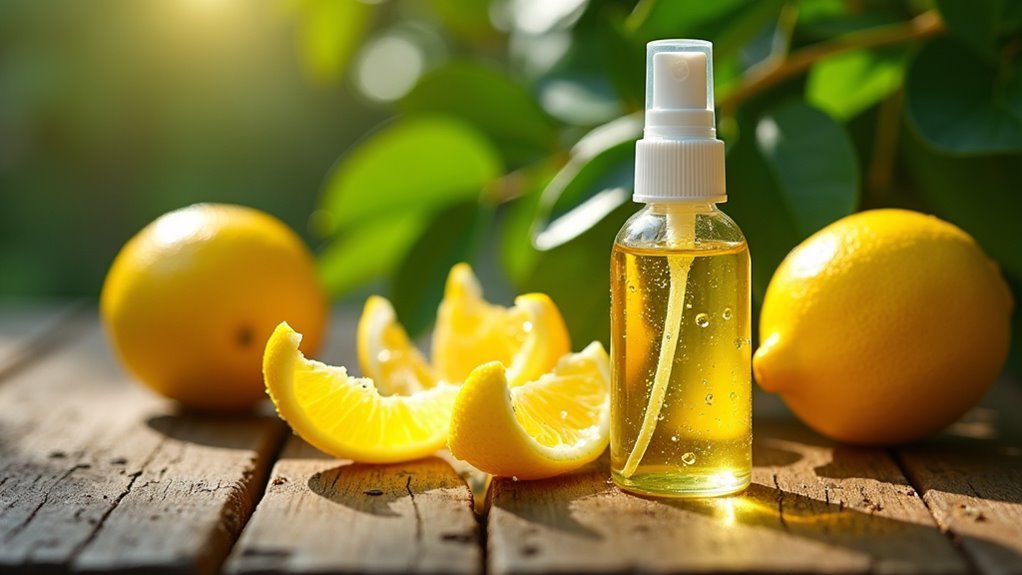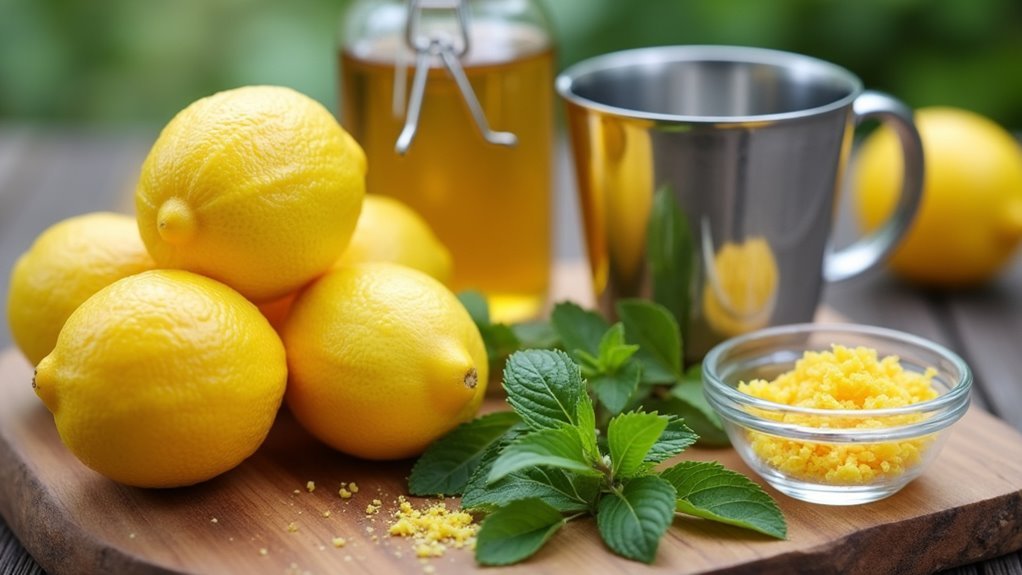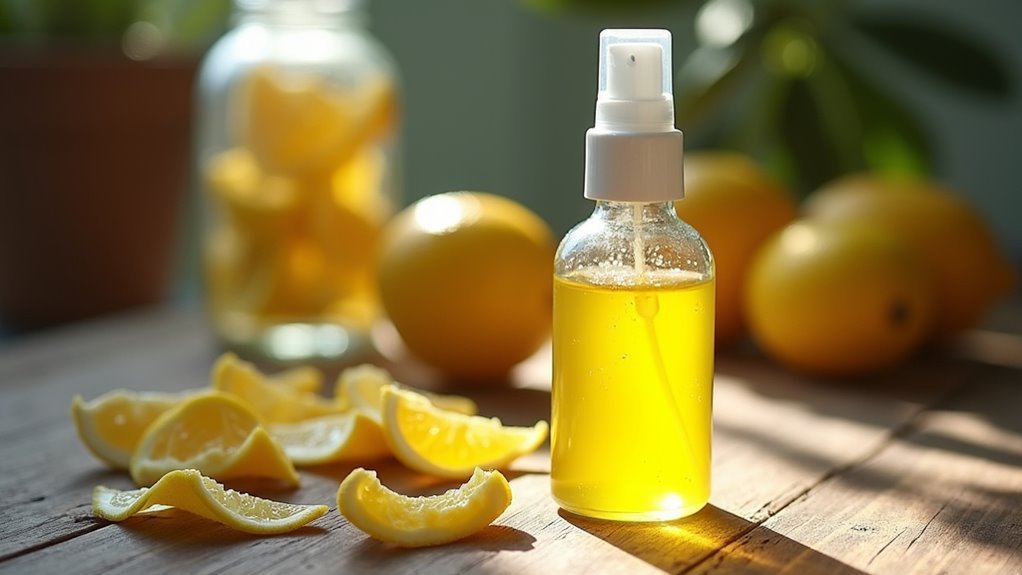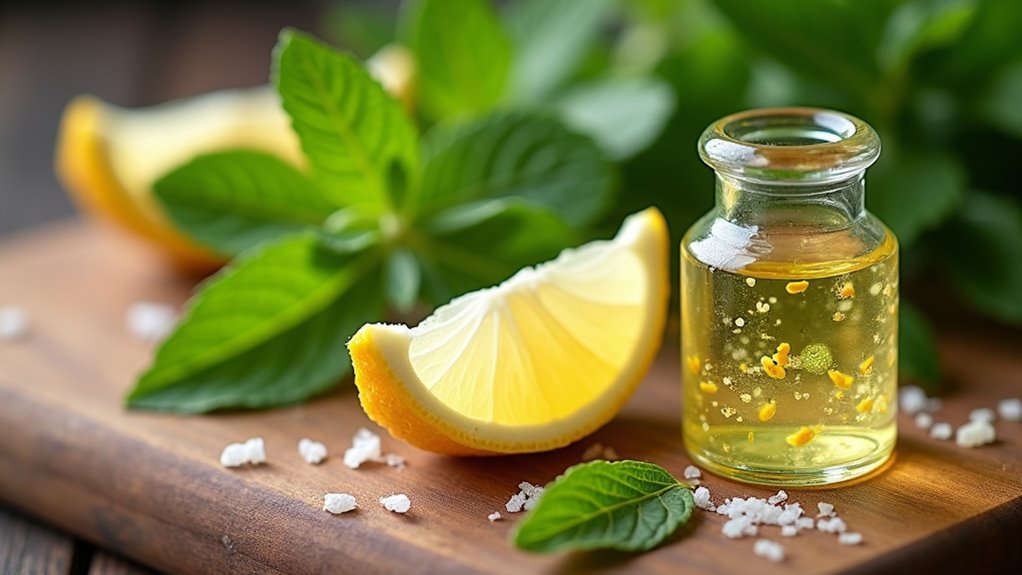You can make an effective mosquito repellent by boiling peels from 2-3 fresh lemons in 2 cups of water for 30 minutes, then straining the mixture into a spray bottle. The natural limonene and citral in lemon peels disrupt mosquitoes’ sensory systems while masking your scent. Apply the spray to exposed skin every 2-3 hours, focusing on ankles, wrists, and neck. Store your homemade repellent in the refrigerator for maximum potency and discover additional enhancement techniques below.
Why Lemon Peels Repel Mosquitoes

When you’re looking for a natural mosquito repellent, lemon peels offer a powerful solution thanks to their potent compounds.
These citrus rinds contain limonene and citral, two substances that effectively repel mosquitoes by disrupting their sensory systems. You’ll find that the strong citrus scent masks your natural human odors that normally attract these pests, making it much harder for them to locate you.
Lemon peels release limonene and citral compounds that disrupt mosquito sensory systems while masking human scents that attract these pests.
The natural ingredients in lemon peels work by interfering with mosquitoes’ ability to detect potential hosts through their specialized receptors. This disruption reduces their tracking capabilities markedly.
Unlike synthetic chemical sprays, lemon peels provide a safer alternative that won’t trigger sensitivities or adverse reactions. You can harness this natural power by creating homemade repellent sprays that combine lemon peel extracts with other ingredients.
Ingredients and Materials Needed
You’ll need fresh lemon peels from 2-3 lemons as your primary mosquito-repelling ingredient, along with 1 cup of distilled water to extract the natural oils. For additional effectiveness, gather witch hazel to enhance the spray’s repellent properties. You’ll also require basic supplies including a clean spray bottle for storage and application, plus a strainer to remove the peels after boiling.
Essential Lemon Peel Components
Creating this natural mosquito deterrent requires just a handful of basic ingredients you likely have at home. Fresh lemon peels contain limonene, a powerful compound that naturally repel mosquitoes through its potent citrus scent. You’ll harness these essential oils to create an effective spray that masks the human scents mosquitoes find attractive.
| Ingredient | Purpose |
|---|---|
| Fresh lemon peels | Primary source of limonene and essential oils |
| Distilled water | Base liquid for extraction and dilution |
| Spray bottle | Easy application and storage container |
The beauty of this recipe lies in its simplicity. Distilled water serves as your extraction medium, drawing out the beneficial compounds from lemon peels. A spray bottle guarantees convenient application around your outdoor spaces, providing targeted protection where you need it most.
Additional Mixing Supplies
Beyond the core ingredients, gathering the right equipment makes your spray preparation smooth and efficient. Your additional mixing supplies include a medium-sized pot for boiling the lemon peels with distilled water, and a fine-mesh strainer to separate the liquid from solid peels after steeping.
You’ll need a clean spray bottle for application – cleanliness prevents contamination and maintains effectiveness. Consider adding essential oils like citronella or eucalyptus to boost mosquito-repelling properties; these mixing materials enhance your spray’s natural effectiveness.
A small funnel helps transfer the cooled mixture into your spray bottle without spills. Finally, choose dark-colored bottles when possible, as they protect the mixture from light degradation and extend shelf life.
Step-by-Step Preparation Method

You’ll start the preparation by boiling 2 cups of water and adding your lemon peels to extract their natural oils.
After steeping and cooling, you’ll strain the mixture and transfer it to a spray bottle for easy use.
The final step involves mixing in optional ingredients like witch hazel to boost effectiveness before applying the spray to your skin and clothing.
Ingredient Preparation Steps
Begin by gathering two to three fresh lemons and carefully removing their peels, ensuring you capture as much of the aromatic outer layer as possible. You’ll want to avoid the bitter white pith underneath while peeling.
Place these citrus peels directly into a medium-sized pot along with 2 cups of water. This natural approach creates effective DIY mosquito repellents without harsh chemicals.
While lemon eucalyptus is often used commercially, lemon peels provide similar protective benefits through their essential oils.
Once prepared, you’ll transfer the finished mixture to a clean spray bottle for easy application. Having your witch hazel ready beforehand streamlines the process, as you’ll add this ingredient after straining the cooled mixture.
Mixing and Application
Now that your peels are ready, bring the pot of lemon peels and water to a rolling boil over medium-high heat.
Let it simmer for 30 minutes to extract those powerful natural oils that mosquitoes hate.
Once cooled completely, strain out the peels and pour the liquid into a clean spray bottle.
Here’s how to enhance your mixing and application:
- Add 1/4 cup witch hazel or vodka as a preservative and emulsifier for better mixing
- Shake vigorously before each use since natural oils separate over time
- Spray on exposed skin and clothing every few hours, avoiding eyes and mouth
The alcohol helps the natural oils blend properly, ensuring consistent protection.
Reapply regularly for maximum effectiveness against mosquitoes.
Application and Usage Guidelines
Once you’ve prepared your lemon peel mosquito spray, proper application guarantees maximum effectiveness against these persistent insects.
Always shake the spray well before each use, as natural oils separate during storage. Apply directly onto exposed skin, focusing on areas mosquitoes typically target like ankles, wrists, and neck. Avoid contact with eyes and mucous membranes to prevent irritation.
For peak protection, reapply every 2-3 hours or immediately after sweating or swimming, since the spray’s effectiveness diminishes over time.
Store your homemade repellent in a cool, dark place to extend its shelf life, as natural ingredients degrade faster when exposed to sunlight or heat.
This simple maintenance guarantees your lemon peel spray remains an effective, chemical-free mosquito deterrent throughout mosquito season.
Storage and Shelf Life Tips

Proper storage directly impacts how long your lemon peel mosquito spray remains effective. Your homemade mosquito repellent maintains ideal potency for about one week when stored correctly. The natural compounds in fresh lemon peels degrade quickly, so proper storage becomes essential for maintaining effectiveness.
Follow these important storage guidelines:
- Use glass spray bottles – Store in a cool, dark place using glass containers to prevent light degradation of essential oils.
- Refrigerate for extended shelf life – Keep your spray refrigerated to extend usability up to two weeks maximum.
- Monitor for spoilage signs – Regularly check for changes in smell or appearance that indicate reduced effectiveness.
For longer shelf life, dry your lemon peels before infusing them in water, as this preservation method helps maintain the spray’s potency considerably longer.
Enhancing Effectiveness With Additional Essential Oils
While your basic lemon peel spray provides decent mosquito protection, you’ll achieve markedly stronger results by incorporating additional essential oils into your mixture.
Adding 15-20 drops of citronella, eucalyptus, or lavender creates a powerful natural mosquito repellent that lasts longer than lemon juice alone.
Tea tree and peppermint oils work synergistically with lemon peel, disrupting mosquitoes’ ability to detect human scents. This combination makes your effective DIY spray markedly more potent against various mosquito species.
For improved application, mix your essential oils with carriers like witch hazel or coconut oil. This helps the repellent adhere better to your skin while enhancing protection duration.
Experiment with different oil combinations based on your scent preferences and the specific mosquito species in your area.
Frequently Asked Questions
How Do You Make Lemon Spray for Mosquitoes?
You’ll boil juice from 1½ lemons with one cup water, then steep for an hour. Pour the cooled mixture into a spray bottle, shake well, and apply to skin and clothing.
How to Use Lemon Peels to Repel Mosquitoes?
You’ll simmer lemon peels in water to release essential oils, then cool and transfer to a spray bottle. Apply the infusion on skin and clothing before outdoor activities, testing sensitivity first.
What Is a Quick Easy Homemade Mosquito Repellent?
You can quickly make mosquito repellent by boiling lemon peels in water for thirty minutes, then cooling and straining the mixture into a spray bottle. It’s simple, natural, and effectively masks human scents.
How Do You Make Homemade Bug Spray That Actually Works?
You’ll need effective ingredients like citronella, eucalyptus, or lemon oils. Mix essential oils with water or witch hazel, add dish soap as emulsifier, then spray on skin and clothes for protection.
In Summary
You’ve now got an effective, natural mosquito repellent that’s safe for your family and the environment. Remember to shake the spray before each use and reapply every few hours for best results. Store it properly to maintain potency, and don’t hesitate to experiment with additional essential oils to boost effectiveness. This simple lemon peel solution will keep mosquitoes at bay without harsh chemicals.





Leave a Reply